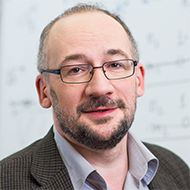- A
- A
- A
- ABC
- ABC
- ABC
- А
- А
- А
- А
- А
- HSE University
- Faculties
- Faculty of Computer Science
- School of Data Analysis and Artificial Intelligence
- News
- Graduate of the School of Data Analysis and Artificial Intelligence Defends Thesis at TU Dresden
-
The School
Pokrovsky boulevard, 11, room S938, Moscow, Russia, 109028
Phone: +7 (495) 772-95-90*27319
The School of Data Analysis and Artificial Intelligence was created in 2014 as part of the Department of Data Analysis and Artificial Intelligence. The school consists of world-renowned researchers who actively participate in international research projects.
Acquaye F. L., Kertesz-Farkas A., Stafford Noble W.
Journal of Proteome Research. 2023. Vol. 22. No. 2. P. 577-584.
Vasilii A. Gromov, Yury N. Beschastnov, Korney K. Tomashchuk.
PeerJ Computer Science. 2023. Vol. 9. No. .
Makhalova T., Kuznetsov S., Napoli A.
Data Mining and Knowledge Discovery. 2022. P. 108-145.
Dudyrev E., Semenkov Ilia, Kuznetsov S. et al.
Plos One. 2022. Vol. 17. No. 10.
Zhirayr Hayrapetyan, Nascimento S., Trevor F. et al.
In bk.: Information Systems and Technologies: WorldCIST 2022, Volume 2. Iss. 469. Springer, 2022. P. 141-147.
Dudyrev F., Neznanov A., Anisimova K.
In bk.: Artificial Intelligence in Education. Posters and Late Breaking Results, Workshops and Tutorials, Industry and Innovation Tracks, Practitioners’ and Doctoral Consortium -23rd International Conference, AIED 2022, Durham, UK, July 27–31, 2022, Proceedings, Part II. Springer, 2022. P. 436-439.
Egurnov D., Точилкин Д. С., Ignatov D. I.
In bk.: Complex Data Analytics with Formal Concept Analysis. Springer, 2022. P. 239-258.
Egurnov D., Ignatov D. I.
Automation and Remote Control. 2022. Vol. 83. No. 6. P. 894-902.
Kudriavtseva P., Kashkinov M., Kertész-Farkas A.
Journal of Proteome Research. 2021. Vol. 20. No. 10. P. 4708-4717.
Kanovich M., Kuznetsov S., Scedrov A.
Information and Computation. 2022. Vol. 287.

Graduate of the School of Data Analysis and Artificial Intelligence Defends Thesis at TU Dresden
Artem Revenko graduated from the HSE’s master’s programme in mathematical modelling in 2011 and doctoral programme in 2013.
Sergei Kuznetsov, Head of the School of School of Data Analysis and Artificial Intelligence was Artem’s Academic Supervisor during his master’s and doctoral studies. While studying at HSE, Artem also studied at TU Dresden, and hence the latest PhD thesis he defended in Dresden was based on his Moscow work.
The idea offered by Artem is based on Formal Concept Analysis and helps automatically generate formal mathematical theories. Put simply, the software system developed by Artem on the basis of this approach helps to find evidence of two mathematical results from general algebra. A researcher, working manually, might spend up to 3 years one of these results and 10 years on the other. The thesis committee included two Academic Supervisors, Bernhard Ganter and Gernot Salzer, two experts in computer science and a specialist in the thesis area. Artem’s work was graded as ‘Magna cum laude’, corresponding to a score of 8 points on the ten-point grading scale.
- About
- About
- Key Figures & Facts
- Sustainability at HSE University
- Faculties & Departments
- International Partnerships
- Faculty & Staff
- HSE Buildings
- HSE University for Persons with Disabilities
- Public Enquiries
- Studies
- Admissions
- Programme Catalogue
- Undergraduate
- Graduate
- Exchange Programmes
- Summer Schools
- Semester in Moscow
- Business Internship
- © HSE University 1993–2025 Contacts Copyright Privacy Policy Site Map
- Edit

